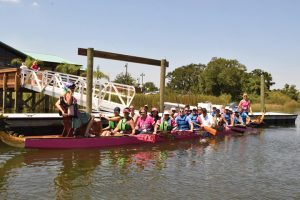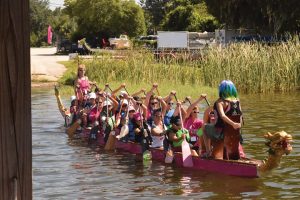A Boatload of Support
Warriors on Water invites breast cancer survivors to not only discover the world of competitive dragon boats, but also join a team waiting to greet them with open arms.

When a group of women convened in a Hard Rock Café meeting room about 15 years ago, they found themselves in the unusual position of holding oar-length sticks “with all these strange people sitting on what looked like a miniature picnic bench, trying to figure out how to paddle, the rotation, the components of the stroke,” as Sally Florsek recalls.
For many of those women, it was their first foray into the world of competitive dragon-boating, a sport that originated in China more than 2,500 years ago with teams of roughly 20 racing canoe-like, dragon-shaped vessels. Each was curious about the concept bringing them together: forming the team that would eventually become the Orlando-based Warriors on Water, drawing on their common experience of surviving breast cancer and building on their shared desire to prove that it’s not a life sentence. And just as their diagnoses, treatments and recoveries demanded that they all summoned a previously unknown strength within themselves, they looked to dragon-boating as a new outlet for demonstrating just how unstoppable they could be as a team.
“Everyone wants to win!” affirms Florsek, current president of Warriors on Water. “There’s an empowerment, a restoration of who you were before cancer. It’s hard to explain if you haven’t been through it, but this allows you to be the person you were, to help you still find that command and control.”
Florsek is one of Warriors on Water’s original members, though she has stepped away from the team as life demands. But she, like every other member who’s taken a break and inevitably returned, has always been warmly welcomed back to the sisterhood.
That warmth and implicit inclusion are what members often cite as the team’s most notable hallmarks.
“The people who love you—your family—it affects them when you go through cancer, so you don’t share everything with them,” Florsek begins. “This team, they don’t need that protection, so they can take on the stuff that you feel like you should keep from the other people around you. This team loves you and understands you in a way that no one else can.”
“You gain so many friends,” adds team historian Karen Iafratto, also an original member. “You get that camaraderie, the daily texts checking in on how your recovery’s going, how you’re feeling today. … Not everyone is ready to get on a boat and paddle right away but when you are, you get this community and sisterhood that gives so much to each other.”
It’s a connection that transcends individual teams, too. Since Central Florida is home to a number of dragon-boating teams not only comprising cancer survivors but also open to anyone, many of the ladies typically wearing Warriors on Water regalia have rowed both for teams and with opponents they’ve competed against, demonstrating just how close-knit the community is. As members have traveled throughout the state, all over the country and around the world to go for the gold, they’ve even forged those bonds across the globe.
“I’ve gained a lot of good friends from this that aren’t even locally in Orlando: I’ve met them in Canada, New Zealand and Italy,” Iafratto says. “When we competed in Italy, we had to fill the boat with people from different places, and I’m still good friends with them—there was one woman from Illinois, I’ve stayed at her house when I’ve gone to visit her.”
Bonnie Waldrop is one of the newest members of the team. Despite adamantly insisting that she’s never considered herself an athlete, her love of kayaking inspired her to check out a nearby dragon-boat race featuring “this group of ladies all dressed in pink” while visiting a friend in Oklahoma City; within that week, she found herself “paddling my little heart out” in her first time with Warriors on Water—which was also her first competition.
Taking that leap so quickly was admittedly a little daunting, but being met by her future teammates’ immediate and genuinely encouraging support made it a lot easier to greet their enthusiasm with her own.
“I told them that I didn’t know anything about dragon-boating, and they were like, ‘Oh, don’t worry about it, you’ll get your feet wet in the best way possible,’” Waldrop remembers. “When I showed up, they all welcomed me and actually knew my name, like, ‘We’re so glad you’re here, you must be Bonnie—now come on, get in the boat!’ I did two races that day, with the woman behind me giving me directions and hints. The sisterhood, the camaraderie, the support were immediate. That’s how they are, you’re just welcomed with open arms.”
She adds that the physicality alone in “getting bit by the dragon” is beneficial to survivors of breast cancer, but there’s even more to it than that.
“This comes with so many physical and mental and social and emotional benefits,” says Waldrop. “The strength and the welcoming were things I’ve never experienced before. Being able to just share our stories. … Our scars are so normalized now. I have a compression sleeve I have to wear on my arm and it was always something I was self-conscious about. But when I was in the race that first day, one of the women said, ‘Oh, you’ve got mobility issues with that arm? Why aren’t you wearing your sleeve?’ Everything is so familiar to them, they know what everyone is going through.”
That tight bond unifying the group is crucial come competition. When they’re on the water with their eyes on the prize, the reservoir of strength every woman pulls from propels them forward together as a well-trained, well-synchronized unit.
“The boat is where you forget all your worries and you’re just focused on paddling in sync with your sisters,” says Iafratto. “We all push each other to be a little better than yesterday. You do these races and even if you don’t medal, you still get that camaraderie, that feeling that ‘Hey, I did this!’ It’s a whole team that did it together.”
 That strength isn’t just reserved for the boat, though. Given the nature of what unites them, each woman knows the others have also stared down mortality and won—just as they know they may have to one day go through it all again. For those who come face to face with cancer once more, they know compassionate, hands-on support is never far away.
That strength isn’t just reserved for the boat, though. Given the nature of what unites them, each woman knows the others have also stared down mortality and won—just as they know they may have to one day go through it all again. For those who come face to face with cancer once more, they know compassionate, hands-on support is never far away.
“All the women on this team helped me through my second diagnosis,” Iafratto says, her voice thick with emotion. “This time, I had a double mastectomy, and people from the team called me, came over, visited with me, brought me food, slept on a mattress on my floor as I slept on a recliner to help me through that surgery. My daughter is very close to people on the team because I’ve known them for so long, so even she feels that camaraderie, too.”
Making sure that every member of the Warriors on Water team feels their sisters rallying around them is a value each holds dear, as survivorship is a uniquely fraught path where a shared vocabulary and experiential kinship both go a long way in helping others reclaim some peace along life’s rockier patches.
“Cancer is the best worst thing that ever happened to me: You meet some incredible people who really reach out to you, but it’s overall life-changing,” Florsek begins. “I was lost. Cancer took so much from me, and I was looking for something to hold onto. … [When] you join this group as a breast cancer survivor, you get so much more than a gym group. This is a group where all the struggles that you’ve gone through, they’re shared. People understand. You don’t have to hide anything, you can’t say anything stupid, there’s no awkward moments because your experiences are truly shared.”
Of course, they’re also here to celebrate their wins and their strength together, both on and off the water.
“Meeting these women, there is such a strength in realizing that we all kicked [cancer],” Waldrop adds. “My husband would ask me, ‘Don’t you feel proud that you went through it?’ And my thought process was that cancer was one more thing I’ve got to do and take it day by day. But now, it’s kind of like I do have that pride to say, ‘Yeah, I beat it—and look what I’m doing now!”







